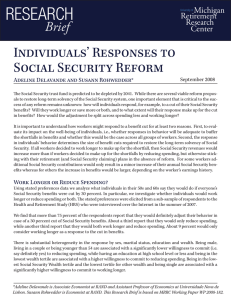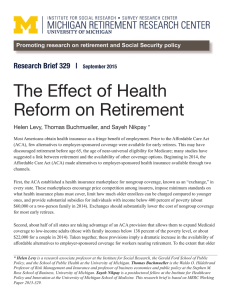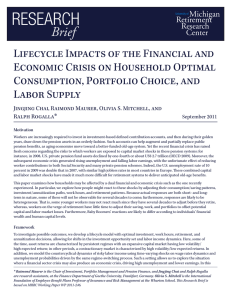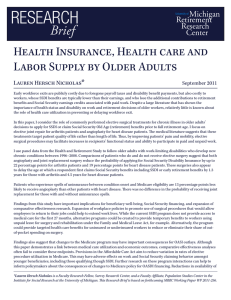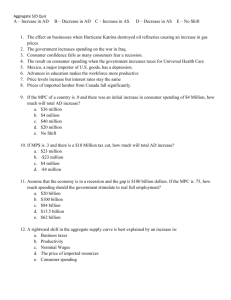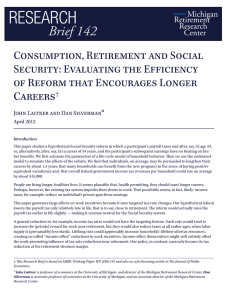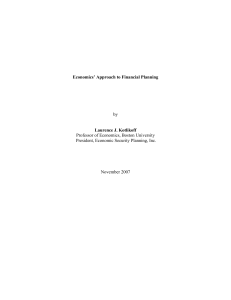ReseaRch Brief The Effects of the Economic Crisis on the Older Population
advertisement
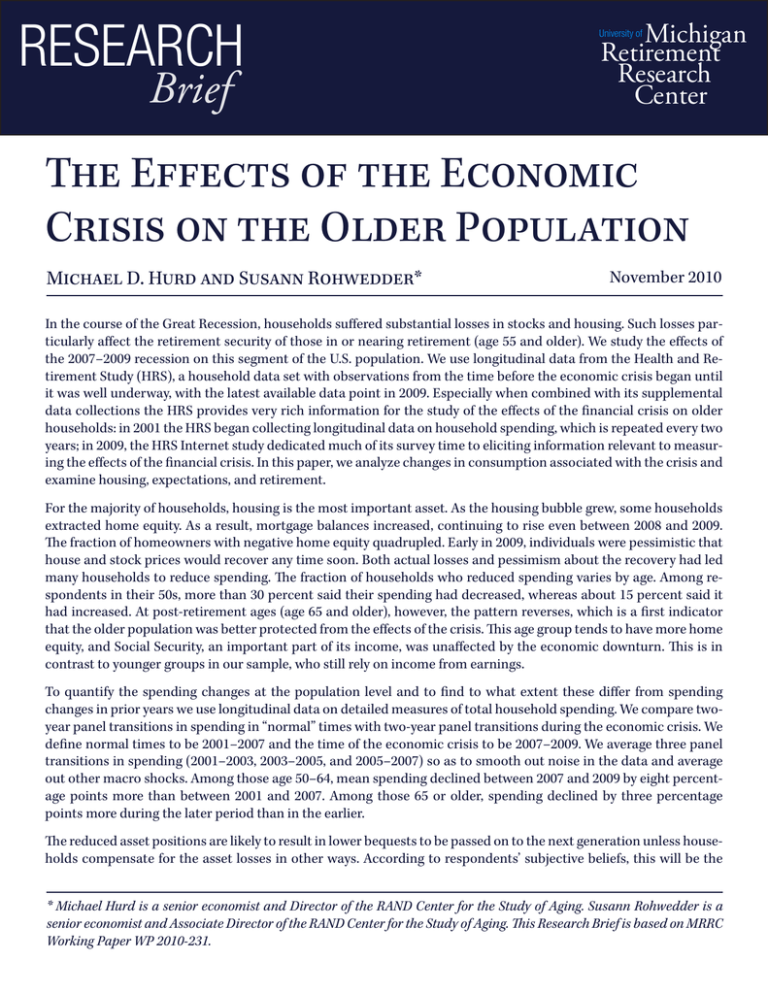
ReseaRch Brief Michigan Retirement Research Center University of The Effects of the Economic Crisis on the Older Population Michael D. Hurd and Susann Rohwedder* November 2010 In the course of the Great Recession, households suffered substantial losses in stocks and housing. Such losses particularly affect the retirement security of those in or nearing retirement (age 55 and older). We study the effects of the 2007–2009 recession on this segment of the U.S. population. We use longitudinal data from the Health and Retirement Study (HRS), a household data set with observations from the time before the economic crisis began until it was well underway, with the latest available data point in 2009. Especially when combined with its supplemental data collections the HRS provides very rich information for the study of the effects of the financial crisis on older households: in 2001 the HRS began collecting longitudinal data on household spending, which is repeated every two years; in 2009, the HRS Internet study dedicated much of its survey time to eliciting information relevant to measuring the effects of the financial crisis. In this paper, we analyze changes in consumption associated with the crisis and examine housing, expectations, and retirement. For the majority of households, housing is the most important asset. As the housing bubble grew, some households extracted home equity. As a result, mortgage balances increased, continuing to rise even between 2008 and 2009. The fraction of homeowners with negative home equity quadrupled. Early in 2009, individuals were pessimistic that house and stock prices would recover any time soon. Both actual losses and pessimism about the recovery had led many households to reduce spending. The fraction of households who reduced spending varies by age. Among respondents in their 50s, more than 30 percent said their spending had decreased, whereas about 15 percent said it had increased. At post-retirement ages (age 65 and older), however, the pattern reverses, which is a first indicator that the older population was better protected from the effects of the crisis. This age group tends to have more home equity, and Social Security, an important part of its income, was unaffected by the economic downturn. This is in contrast to younger groups in our sample, who still rely on income from earnings. To quantify the spending changes at the population level and to find to what extent these differ from spending changes in prior years we use longitudinal data on detailed measures of total household spending. We compare twoyear panel transitions in spending in “normal” times with two-year panel transitions during the economic crisis. We define normal times to be 2001–2007 and the time of the economic crisis to be 2007–2009. We average three panel transitions in spending (2001–2003, 2003–2005, and 2005–2007) so as to smooth out noise in the data and average out other macro shocks. Among those age 50–64, mean spending declined between 2007 and 2009 by eight percentage points more than between 2001 and 2007. Among those 65 or older, spending declined by three percentage points more during the later period than in the earlier. The reduced asset positions are likely to result in lower bequests to be passed on to the next generation unless households compensate for the asset losses in other ways. According to respondents’ subjective beliefs, this will be the * Michael Hurd is a senior economist and Director of the RAND Center for the Study of Aging. Susann Rohwedder is a senior economist and Associate Director of the RAND Center for the Study of Aging. This Research Brief is based on MRRC Working Paper WP 2010-231. case and the reductions may be sizeable (about 20 percent on average). The distribution of beliefs has clearly shifted toward the lower wealth bands. We calculate expected bequests and find that they declined from $536 thousand in 2008 to $436 thousand in the HRS Internet survey. Of course this reduction is entirely dominated by the top interval, which is a result of the highly skewed distribution of wealth. The median household will therefore not see much change. Over the past 20 years, the older population has remained in the labor force at increasing rates. We expect that the financial crisis would have had two opposing effects on retirement. The declines in stock and possibly housing values should have delayed retirement because of the unexpected loss of wealth. Yet the worsening of the labor market and increased risk of unemployment should have led to earlier than expected retirement because the older population often has more difficulty finding a job after a period of not working. The net effect is an empirical matter. According to respondents’ own expectations (elicited as the chance that they would work past age 62 or age 65), it appears that the economic downturn will accelerate this trend for older workers to remain in the labor force, somewhat relieving financial pressure on the Social Security and Medicare programs. We should note, however, that the stock market reached its low in March 2009 — just a month before the HRS Internet survey was initially fielded. Since then, it has recouped some of its earlier losses. Also, the unemployment rate today is slightly higher than during the Internet survey and any expectations among respondents at the time of the survey that the unemployment rate would recover quickly were not realized. Instead, the mood about the labor market is likely worse today than in May 2009. In sum, the economic crisis has caused households in and near retirement to suffer sizeable losses in assets. These households responded in several ways: they reduced spending and with that increased saving, they intend to work longer, and anticipate bequeathing less. University of Michigan Retirement Research Center Institute for Social Research 426 Thompson Street Room 3026 Ann Arbor, MI 48104-2321 Phone: (734) 615-0422 Fax: (734) 615-2180 mrrc@isr.umich.edu www.mrrc.isr.umich.edu The research reported herein was performed pursuant to a grant from the U.S. Social Security administration (SSA) through the Michigan Retirement Research Center (MRRC). The findings and conclusions expressed are solely those of the author(s) and do not represent the views of SSA, any agency of the federal government, or the MRRC. Regents of the University of Michigan: Julia Donovan Darlow, Laurence B. Deitch, Denise Ilitch, Olivia P. Maynard, Andrea Fischer Newman, Andrew C. Richner, S. Martin Taylor, Katherine E. White, Mary Sue Coleman, Ex Officio

